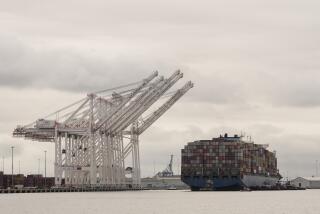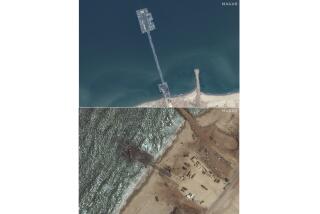Major Port in Kuwait Reopened to Big Ships : Reconstruction: Minesweepers clear path to Shuaiba. The first cargo to arrive is potable water.
- Share via
SHUAIBA, Kuwait — Swept clear of mines but still plainly ravaged by war, this major port reopened to international commerce early Tuesday, Kuwait’s first open link to the sea since being overrun by Iraq seven months ago.
Within hours, at least two merchant ships, one American and the other Soviet, began unloading their cargoes of potable water, 11 million gallons in all, for Kuwaitis whose water supply system was all but destroyed during the war.
“So many things need to be done . . . to put this country back on its feet,” said Edward W. (Skip) Gnehm, U.S. ambassador to Kuwait. “Thank God . . . we were able to clear and put this port back into operation.”
A steady parade of freighters bearing essentials from toilet paper to building supplies is expected to arrive in coming days.
Officials had estimated that it might be another month or more before the massive, man-made harbor just south of Kuwait city could be made safe for large vessels.
After the Iraqis retreated, coalition forces found waters inside the facility coated with oil--in some areas a foot thick--from deliberately ruptured pipes, while explosive mines dotted its outward approaches.
Pipeline damage, however, was not as extensive as originally feared and, while a rainbow of oil continues to foul the harbor, workers have successfully vacuumed much of the spilled crude using portable booms.
At the same time, a multinational fleet of U.S.-led minesweepers was able to secure a narrow sea channel leading into the port, which divers deemed secure only Monday after scouring it for eight days.
At least one mine was found in the harbor, according to U.S. Coast Guard Capt. Fred Wilder, whose personnel have been charged with securing the port.
More than 250 other mines have been discovered off Kuwait’s coast and destroyed, according to U.S. Navy officials, but there may be more than 750 others still lurking in the Persian Gulf.
“The Iraqi soldiers may have surrendered,” observed Rear Adm. Raynor A. K. Taylor, “but their mines have not. And there are a lot of them out there.”
Taylor, commander of U.S. naval forces in the Middle East, presided as grand marshal of sorts over an elaborate ceremony formally marking the reopening of Shuaiba, by far the largest of Kuwait’s four commercial ports.
Preceded into Shuaiba by a British minesweeper, Taylor’s command ship, the La Salle, slowly steamed into the harbor as a British marching band ashore played “When the Saints Go Marching In” and the theme from the musical “Porgy and Bess.”
The pier to which the La Salle moored was littered with the remains of sandbagged Iraqi bunkers and other fortifications razed by coalition bulldozers.
In their hasty retreat from the port area, the Iraqis left behind massive stockpiles of ammunition and explosives, a seagoing patrol boat and at least one artillery piece.
Smoke overhead from 500 oil well fires burning out of control turned midmorning into dusk, but the admiral’s mood was hardly gloomy as he welcomed Ambassador Gnehm and various Kuwaiti dignitaries aboard the La Salle.
“A magic day,” Taylor beamed as he shook hands with Habib Hiyat, Kuwait’s minister of communications.
“We will not forget what our friends did for us,” Hiyat declared.
At present, the one channel cleared of mines that leads into Shuaiba is only about 2,000 yards across at its widest--not wide enough to safely accommodate two-way traffic, Taylor said. Also, it does not provide a direct route into the port complex, but rather it twists and turns.
To raise the “comfort level” of frustrated and skittish merchant captains, Taylor said, minesweepers will both expand the sea lane and open another lane directly into the port. They also will continue providing escorts through gulf waters until all known minefields are swept clean.
The process could take six months or more, he said, adding, “These are dense minefields.”
Australia, Britain, Germany and the Netherlands, among others, have committed minesweepers to the clearing operations, which Taylor described as among the most extensive in history.
More to Read
Sign up for Essential California
The most important California stories and recommendations in your inbox every morning.
You may occasionally receive promotional content from the Los Angeles Times.













